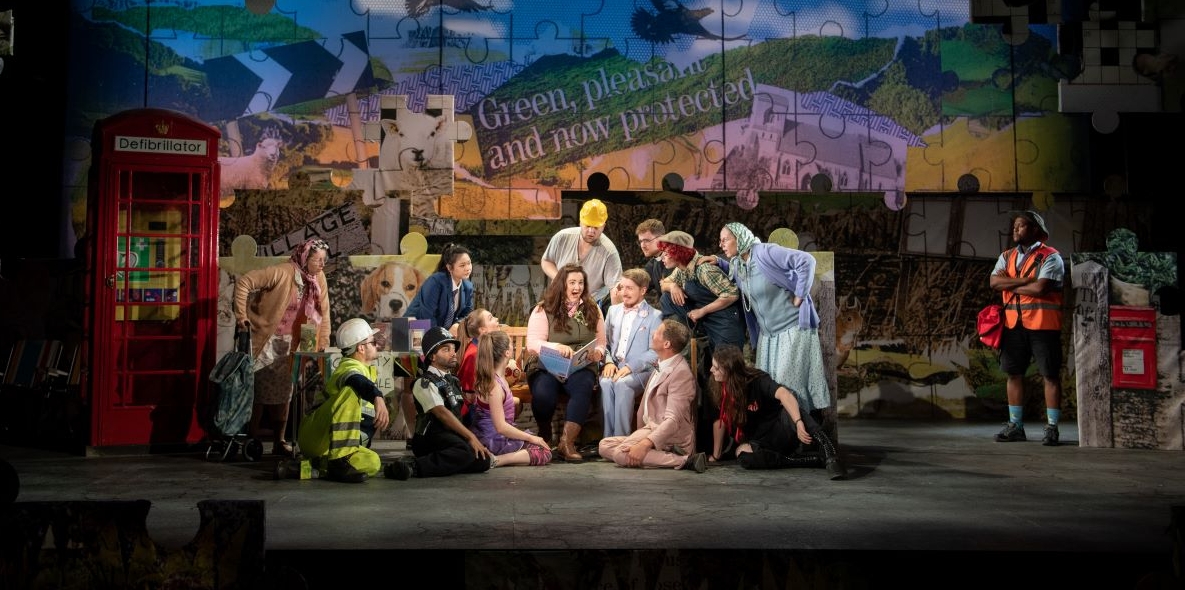A hit show of 1832 has been given some of the updating that must convey to its audience something of the original surprise, poignancy and fun that the original audiences must have felt. L’Elisir d’Amore at Longborough Festival Opera this summer has been placed in an English village today with a vicar, a disused phone booth and villagers consulting their smart phones. The set is a jigsaw puzzle of colour and ecological concern. The fine ensemble cast manages to convey both the hilarity and the potential pain of the tale as well as a real sense of a community. I wish I could name check every single member of the inclusively cast chorus. The characterizations of each person are lovingly played out down to the village cop and a happy gay couple.
Gianetta is sung with marvellous soubrette lyricism by the delightful Haegee Lee. She possesses a strong, pliant soprano voice, Dressed in a school uniform, Lee moves around on her scooter, her characterization full of vibrancy and assertiveness. Belcore, played by Arthur Bruce, is here a pilot in an air force squad, arriving from his plane singing mellifluously and behaving with smug self-confidence. Adina is too smart to love him, but she’s happy to manipulate him into a position that makes Nemorino despair with jealousy. Thando Mjandana and Jennifer Witton, as Adina and Nemorino, sing with beautiful voices and act so that the real emotion of each character shines through. They also manage to convey in both their acting and their singing just how they grow and change on this amazing day.
The arrival of Dr Dulcamara and his blissfully confident snake oil marketing act gives us one of the great highlights of this opera which is directed by Max Hoehn with intelligence, inventive stage business and a clear sensitivity to highlighting its most famous moments. Emyr Wyn Jones is an enormously engaging and theatrically exciting Doctor Dulcamara, with a fulsome voice and a vivacious acting ability that are both clearly made for a great range of roles and styles. The tattoos that are part of his costume certainly convey a modern, psychological subtext to his con man; his humour and energy are those of a superb showman. He has an effulgent voice and is simultaneously captivating and appallingly mendacious as a character; you can certainly see why the villagers are all taken in by his spiel and rush to buy his concoctions with a tap of their phones.
Thando Mjandana sang his part, especially the famous “Una furtive lagrima”, with such a sense of sincerity and sweetness both in his demeanour and in his timbre, that every moment he was on stage worked. Jennifer Witton has a beautiful soprano voice and she was able to convey the whole “enemies to lovers” psychology of Adina through sheer control of her singing.
The directing of this production by Max Hoehn shows a consistent vision and a great sensitivity to the work and is one of the elements of the complete success of a show that was interestingly designed by Jemima Robinson and performed with notably consistent commitment by everyone on the stage. As the story developed the singers were able to convey the increasing poignancy of the situation. It was an utterly captivating evening of drama and entertainment made coherent by the stylish conducting of Alice Farnham. She obviously has the measure of this brilliant, witty and beautiful score and understands its idiom thoroughly.
This production proves that L’Elisir d’amore is still a hit show after 191 years! Billed in its day as a melodrama giocosa, this performance conveys the intended hilarity but also the romance and pain of the drama and the sense of how nearly we can all make mistakes and mess up the relationships that are meant to be our true love.

